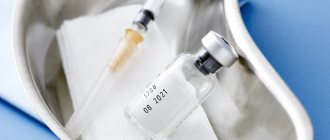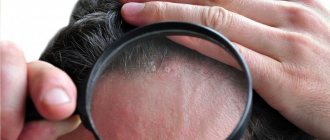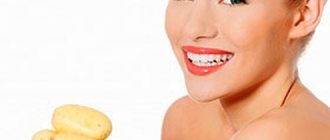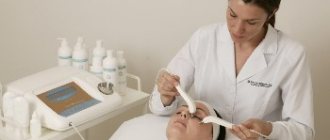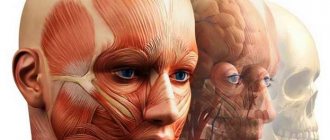Causes of acne
Acne is one of the most common skin diseases.
It is generally accepted that 4 pathogenetic factors play a major role in the occurrence of acne:
- follicular hyperkeratosis;
- increased activity of the sebaceous glands;
- excessive amounts of pathogenic bacteria P. Acnes;
- inflammation and immune response.
These classic links in pathogenesis apply to all types of acne , but when it comes to late acne in women, the following reasons become more and more clear:
- genetic predisposition;
- hormone levels;
- diets;
- smoking;
- stress.
Let's look at the last point in a little more detail.
Back in 1949, Sulzberger and Zaidens wrote: “There is probably no other disease that causes more mental stress, misunderstandings between children and parents, more general self-doubt and feelings of inferiority, and a great deal of mental suffering than acne vulgaris.”
This statement fully reflects how acne contributes to the formation of mental and adaptation problems, but the reverse relationship: stress as a cause of acne formation has been discussed relatively recently.
In physiology, stress is synonymous with general adaptation syndrome.
General Adaptation Syndrome is a set of protective adaptive mechanisms of the body aimed at preserving and maintaining the integrity of the body under conditions of a long-term stressor.
The depth and duration of stress depend on the strength and duration of the damaging factor - the stressor.
A stressor is not only nervous tension or emotional discomfort.
The main stressors in our lives:
- lack of sleep;
- pain:
- hypoxia;
- various antigens (excessive use of drugs, habitual intoxications, frequent viral and bacterial infections);
- strict diets (deficiency of macro- and microelements);
- unfavorable climatic conditions (excess and lack of UV rays);
- psycho-emotional and social pressure from society.
Thus, more and more scientists agree that stress can not only occur as a reaction to diseases and pathological conditions of the skin, but also in itself worsen the health of the skin.
The appearance of acne due to nervousness50
Emotions are the most characteristic manifestations of human mental activity. They are accompanied by endocrine and autonomic changes, which are associated with the release of various hormones, for example, stress and androgens. Hair follicles and sebaceous glands have androgen-dependent receptors; their stimulation significantly increases sebum production, which can cause seborrhea, dyskeratosis, and maintain local inflammation.
High androgen levels may be associated with physiological factors, for example, in women their levels increase before menstruation, and in adolescents during puberty. But the concentration of androgens can also increase due to emotional experiences or stressful situations, this explains the appearance of acne* due to nervousness.
An increase in the production of adrenocorticotropic hormone leads to an increase in the production of androgens and glucocorticosteroids by the adrenal cortex. An increase in the level of the latter can cause inhibition of the phagocytic component of immunity, reduce the activity of macrophages, and create conditions suitable for increasing the colonization of propionibacteria inside the pilosebaceous follicle. Increased production of adrenaline stimulates lipogenesis, which can maintain inflammation.
What explains such a close relationship between stress and acne?
Under stress, two hormonal systems are activated and an increased amount of cortisol is produced, and the concentration of adrenaline also increases.
Stress hormones have both systemic and local effects, including on the skin.
Glucocorticoids produced in the body during stress suppress the secretion of the skin's own lipids and thereby worsen the skin barrier function.
And given the fact that dermatological drugs prescribed for acne often thin the skin barrier, these new data allow us to be especially careful about restoring the hydro-lipid mantle in patients with acne.
Treatment of acne* on the face for nerves
If acne* appears due to nerves, in addition to basic drug treatment, you may need to prescribe sedatives and consult a psychologist. Appointments between the dermatologist and other specialists must be coordinated.
Azelik®5 gel can be used in the treatment of mild to moderate acne. This is an azelaic acid preparation that has the following effects5:
- exhibits antimicrobial activity against Propionibacterium acnes and Staphylococcus epidermidis;
- contributes to the normalization of keratinization processes;
- helps reduce fatty acid levels;
- helps reduce inflammation by reducing neutrophil metabolism and their synthesis of free radical oxygen species.
The first results from treatment with Azelik® gel, as a rule, become noticeable after 4 weeks of its use5.
Third stress system?
Relatively recently, a theory arose that in addition to the two classically known stress systems, there is a third one, and its fibers are located directly in the skin and, moreover, their terminal processes penetrate the most superficial layers of the epidermis.
Pavlovic S. and a group of comrades demonstrated during experiments that peripheral nerve fibers are capable of transmitting stress impulses to the skin, increasing inflammatory processes in it.
And since inflammation is one of the key links in the development of acne, serious research and development of external cosmeceuticals began, aimed at inhibiting the activity of the third stress system.
Hormonal acne
02.08.2021
Hormonal acne is a form of acne . It primarily affects adult women. The disease is associated with the functioning of the endocrine system and periodic changes in hormone . Hormonal acne can be treated with medications and natural methods
Acne is primarily associated with a temporary problem during adolescence, when the concentration of sex hormones in the body changes. Unfortunately, more and more cases of this skin disease are being found in adults, especially women between the ages of 25 and 35. This type of condition is known as hormonal acne . His treatment is carried out by a dermatologist and endocrinologist . Specialized therapy is supported by home and natural methods.
Hormones and acne
Various types of dysfunction of the endocrine system , consisting of an increase or decrease in the concentration of certain hormones , contribute to increased work of the sebaceous glands and hyperproduction of sebum. As a result, the ducts that carry secretions out are blocked, and painful pustules, papules and nodules appear on the skin of the face , neck , back and décolleté. These symptoms are known as hormonal acne or adult acne
The hormones that cause acne are primarily androgens (male sex hormones ) - testosterone, dihydrotestosterone and androstenediol. However, sometimes it is the increase in the concentration of estrogens ( female sex hormones ) that causes skin changes to appear. Their rapid concentration occurs before menstruation or during menopause . For this reason, women over 25 years of age are most often affected. Hormonal acne in men is rare.
It should be noted that endocrine , excess sebum production and hormonal acne in adults: genetic predisposition, long-term stress, improper skin care, stimulants and diet .
Symptoms of hormonal acne
Symptoms of endocrine acne largely depend on which hormones contribute to the onset of the disease. Androgens cause large and painful bumps and blackheads on the skin of the face (forehead, chin, jawline), neck and back . The complexion is also oily and shiny, skin lesions rarely become inflamed. When estrogen is responsible for acne , rashes appear nose They appear as burning or itchy spots and bumps. Their occurrence is preceded by redness of the central part of the face as a result of vasodilation .
Hormonal tests for acne
Hormonal tests for acne should be taken before starting treatment. The order is issued by the attending physician - a dermatologist or endocrinologist . They are carried out in the morning in the laboratory . For women, the day of the menstrual cycle is important. The test involves taking a blood . Test results are usually available the next business day.
The following tests are usually prescribed for adults:
- total testosterone;
- without testosterone;
- dehydroepiandrosterone (DHEA);
- thyroid hormones ;
- prolactin;
- follicle-stimulating hormone (FSH);
- luteotropic hormone (LH);
- insulin.
How to treat hormonal acne?
Hormonal treatment for acne is selected individually for each patient. Therapy is long-term - usually several months. Most often it involves the use of oral medications and local pharmacological agents in the form of creams and ointments.
Acne can be treated with antibiotics or retinoids (vitamin A derivatives). Both drugs are very strong and should only be taken under medical . Sometimes the decision is made to add birth control pills. Acne hormones balance the endocrine system .
Hormonal treatment for acne is ineffective if the skin is not properly cared for at the same time. People suffering from this condition should use ethanol-free cosmetics designed for acne -prone skin. The face should be cleansed and then moisturized. Regular removal of excess sebum and exfoliated epidermis improves skin condition and prevents the formation of new changes.
Diet for hormonal acne
Diet can have a significant impact on the appearance of your skin. The diet for hormonal acne should be rich in vitamins and nutrients that support the regenerative processes of the epidermis. The menu must include foods high in vitamins A, E, C and B, as well as zinc and selenium. It is not recommended to eat processed foods, fast food, hot spices and foods with a high glycemic index.
Published in Dermatology Premium Clinic
Psychological causes of diseases: how immunity depends on stress
The human body is a complex self-regulating system. For its balanced functioning, the mental state is no less important than the physical one. How psychological aspects affect our health and immunity, says Ekaterina Pisarenko, a specialist at the Moscow Psychological Assistance Service.
The body and its systems
Our body is controlled by three regulatory systems: nervous, endocrine and immune. They are closely interconnected.
- The nervous system controls the entire body through neurotransmitters. With the help of the senses, the brain provides us with information about the world around us. It evaluates reality and gives the body a command for further actions, sometimes this happens in a split second.
- The endocrine system , having received a command from the brain, releases hormones that increase or decrease blood pressure, increase or decrease blood flow to the brain and muscles. Hormones also influence other important changes in the body. The endocrine system responds within minutes or hours
- The immune system releases substances such as cytokines. Their task is to resist everything harmful and foreign that can harm the body. The immune system response lasts for months and sometimes years.
As a result, a holistic system of body regulation arises. And if the work of the brain and the endocrine system has been studied quite well, then with the activity of the immune system everything is not so obvious.
How does immunity work?
Immunity is resistance to infections: viruses, bacteria, foreign material. Immunity can be divided into congenital (natural, borrowed from the mother) and acquired (formed during a person’s life, after illnesses).
The human immune system includes many elements: bone marrow, thymus, spleen, lymph nodes, lymphoid tissue. These organs produce several types of cells, which provide protection for the body and also monitor the constancy of the cellular composition. Among the main ones are phagocytes, lymphocytes (produce antibodies), T-killers, etc. All cells of the immune system work like a well-coordinated team: some absorb, others mark, others bind, others act chemically on foreign substances and molecules (viruses, bacteria, cells tumors).
It is known that prolonged stress or prolonged depression negatively affects the functioning of immune cells: they suppress their activity and increase susceptibility to infectious diseases.
Stress scenario
The concept of stress was introduced by Canadian physician and biologist Hans Selye in 1936. He found that the human body reacts biochemically in the same way to joy and pain. True, there is still some difference: a person can experience a negative emotion for a long time (then stress becomes chronic), but great joy passes quickly, because its effect is fleeting. It is long-term exposure to strong emotions that negatively affects the body.
Stress is a universal response of the body to a dangerous or significant situation in order to support its survival. Subjectively, stress is experienced as tension. Objectively, during stress, the nervous, immune, endocrine, cardiovascular, muscular and other systems are mobilized.
At the hormonal level, the body is not able to distinguish between the emotions caused by a possible attack by an animal in the wild and the emotions that we experience when talking with our boss. Accordingly, the more situations a person perceives as dangerous or significant, the more susceptible he is to stress. This susceptibility depends on many factors: heredity, physiological and personal characteristics, culture, upbringing, environment. For example, people with a sensitive psyche will react to many events with a surge of emotions.
"I can not do it anymore!"
Emotions are material. All our feelings have physical consequences due to the influence of the nervous, endocrine, and immune systems. When we are afraid, happy, angry, delighted or upset, the cells of our body release substances that have a directed effect on the entire body. For example, when afraid, the adrenal glands release the fear hormone - adrenaline - into the blood, and the body instantly reacts to it by increasing the heart rate, increasing blood pressure and blood sugar levels. The blood thickens and rushes to the muscles, the blood vessels narrow. All these changes increase the chance of survival, allow a living organism to escape faster and thereby escape from danger.
In our reality, there are not many situations that directly threaten life, but there are enough circumstances under which a person can be in constant tension: fear of the boss’s anger or dismissal, problems in personal relationships... In these cases, the brain gives a signal to the body: “Run, save yourself! The endocrine system reacts by releasing stress hormones: cortisol, adrenaline, and norepinephrine are released. Hormones, in turn, trigger the body’s reserves - all processes are transferred to a higher level of functioning. In this case, a person does not run away anywhere (as in ancient times from a tiger, for example), but remains in a tense state for days, months and even years.
As a result, a moment comes when the worst result is inevitable: the body is exhausted, all reserves are exhausted and mobilization of strength is no longer possible. In this state, a person is vulnerable and susceptible to many diseases: colds, exacerbation of chronic diseases, depression. The immune system is unable to cope with the disease if the body is exhausted and has no resources.
Is it possible to get sick “from nerves”?
Soul and body are elements of one system. Any imbalance in the psyche affects the functioning of the whole organism. Unexpressed or unprocessed negative emotions, such as fear, guilt, anger, resentment, envy and others, are the main cause of psychosomatic illnesses.
According to the world-famous author of best-selling books on psychosomatics, Liz Burbo, long-term suppressed resentment or hatred can lead, among other things, to the occurrence of cancer.
It is known that cancer cells are formed in the human body every day. Killer T cells based in the immune system destroy these cells, preventing them from developing into tumors. However, it happens that the immune system does not respond to emerging cancer cells, and the tumor begins to grow. Numerous studies and surveys of people with cancer have revealed a pattern: most often the disease occurs after suffering psychological shocks, stress, trauma (loss of a loved one, divorce), internal grievances and disappointments that the person did not survive.
Studies also confirm that people who are diagnosed with a serious somatic illness (cancer or diabetes) significantly increase their chances of a positive prognosis if they do not give up, do not give up, do not become depressed, but, on the contrary, seek help, actively treat the disease, continue to live life to the fullest, communicate with friends and loved ones.
Preventing stress and strengthening the immune system
Fortunately, there are mechanisms that help strengthen the immune system and reduce the negative impact of stress on one's health. These mechanisms are simple, effective and accessible to everyone
- Healthy lifestyle Approaching a more natural rhythm of sleep and wakefulness, as well as proper nutrition, really has a qualitative impact on well-being and health. Doctors recommend: going to bed no later than 23.00; Eat a diet with a higher proportion of unprocessed or minimally processed foods; maintain a normal weight within your BMI (body mass index); add physical activity; get rid of bad habits (if any); practice breathing exercises. You don't have to do everything at once. Start small and step by step! Even 10-15 minutes of exercise every morning and regular adequate sleep can improve your health in a few weeks.
- Movement/Exercise Regular physical activity is a key method of managing stress. During physical activity, the natural mechanism for the disposal of stress hormones is activated. Moreover, with exercise lasting more than 20-30 minutes, endorphins begin to be released - hormones of happiness and pleasure. What kind of physical activity you will have - decide for yourself (when choosing, take into account your individual capabilities). For some, walking in the fresh air is suitable, for others - active training in the gym.
- Psychological assistance A professional will help in teaching methods of relaxation and self-improvement. Working with a psychologist increases self-confidence, helps develop self-support skills, experience grievances and negative emotions, and deal with conflict situations in an environmentally friendly manner.
Help is at hand
If you have psychosomatic illnesses, have difficulties in relationships, or are experiencing constant stress due to hard work, you can seek free help from a psychologist in one of the departments of the Moscow Psychological Assistance Service to the Population. 24-hour telephone number for emergency psychological help in Moscow - 051 (from a landline phone), +7 (495) 051 (from a mobile phone). The psychological support chat on the website www.msph.ru is also available 24/7.
Source
Press service of the Department of Labor and Social Protection of the Population of Moscow
